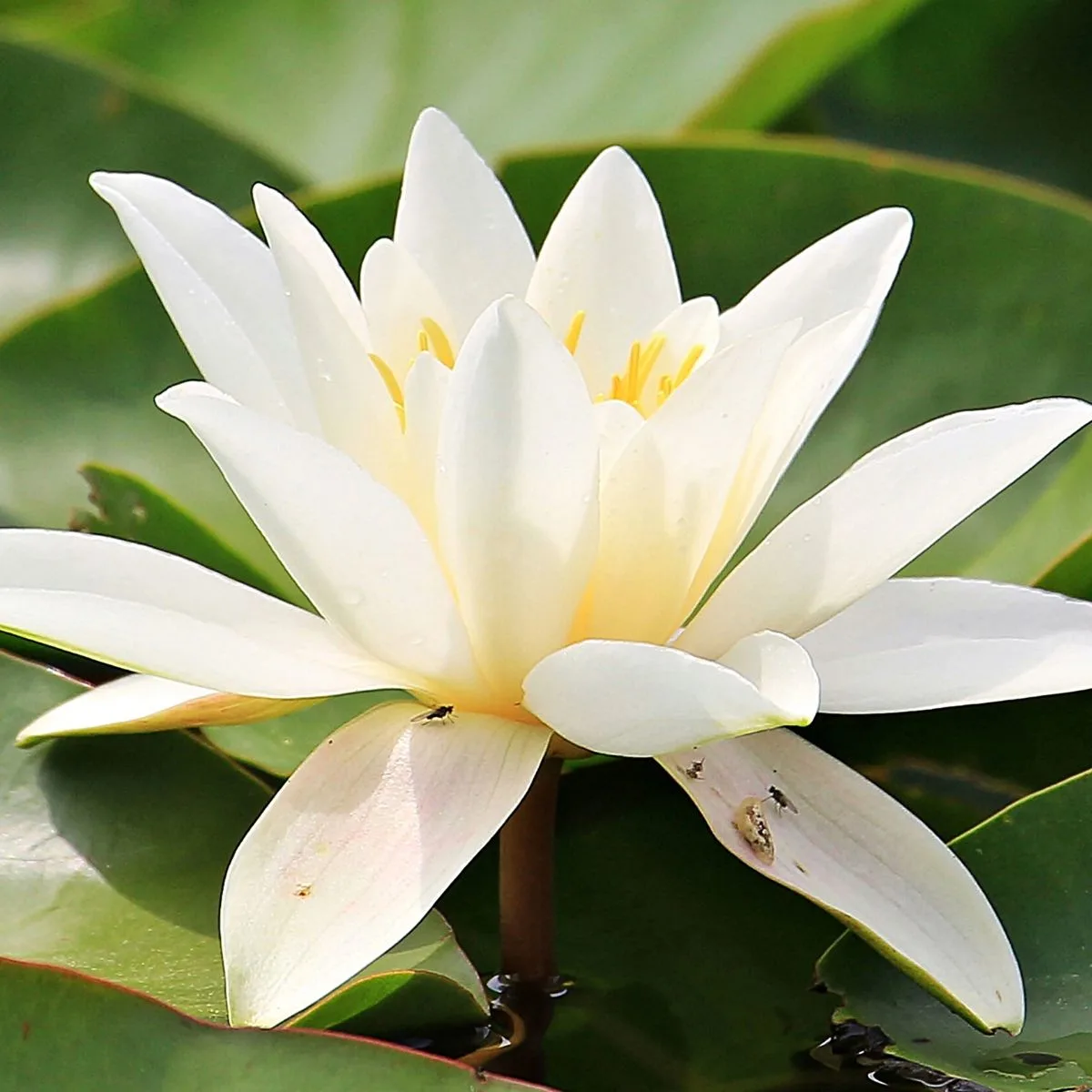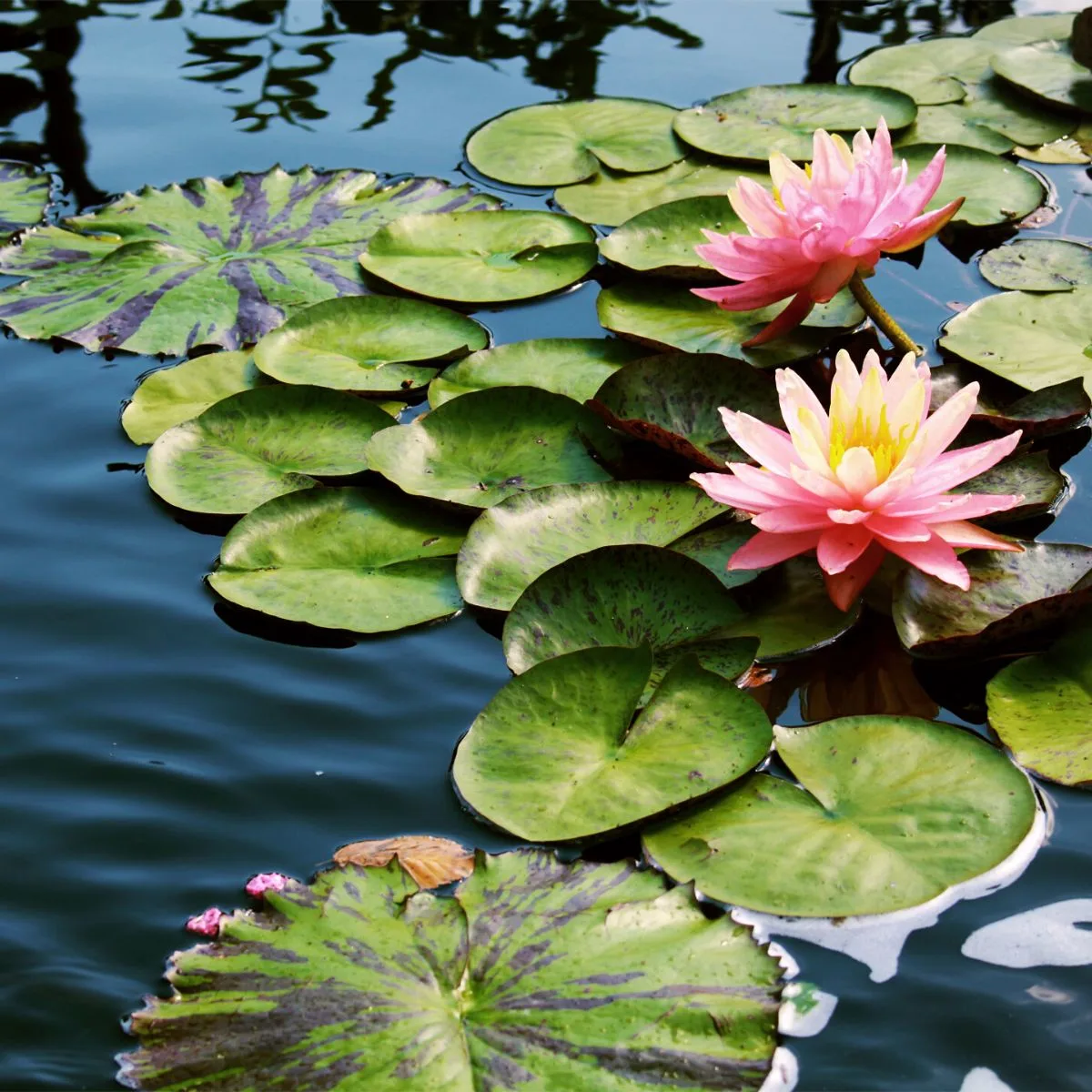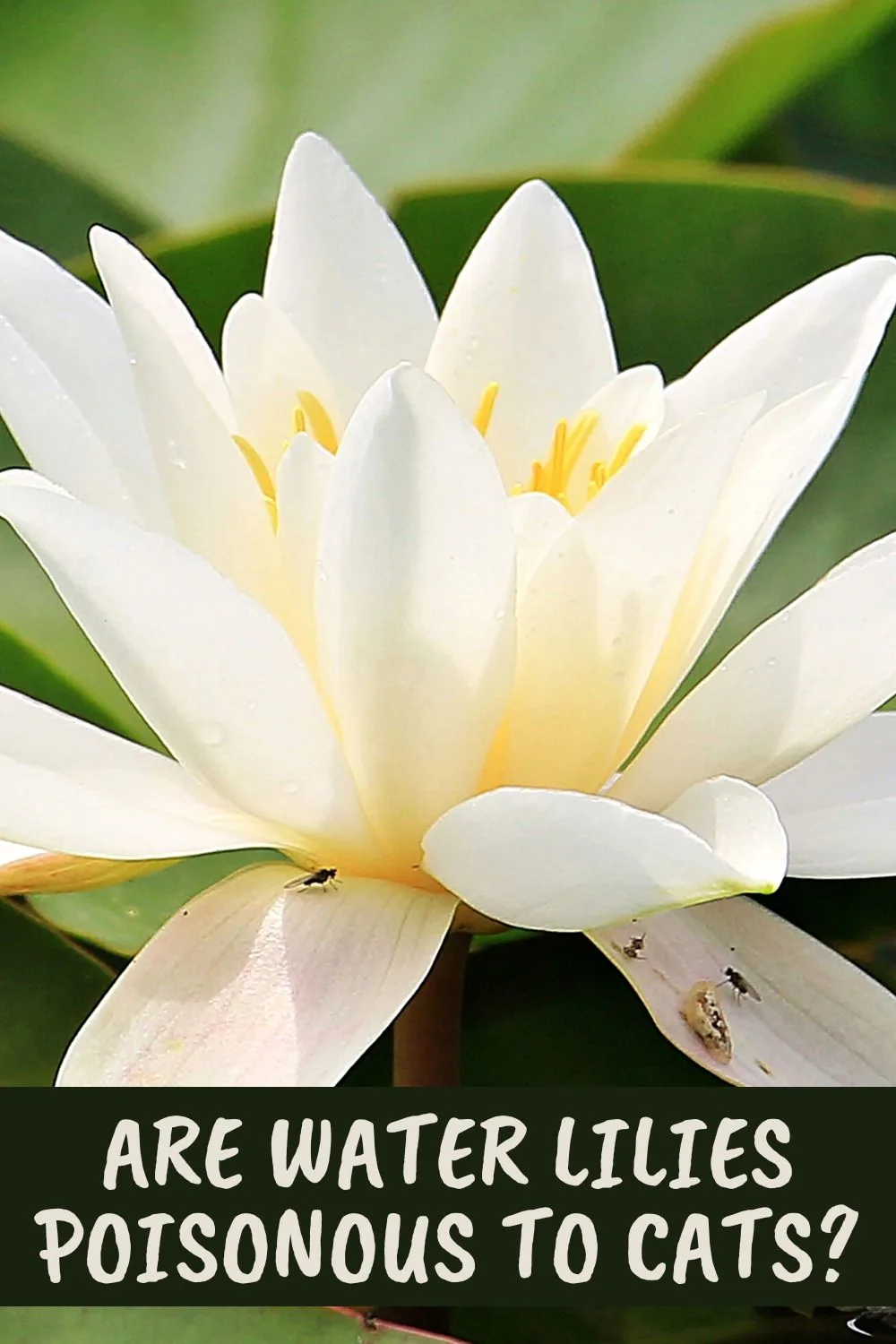Are water lilies poisonous to cats? Here’s a question every cat owner should be asking if they don’t know the answer. Lying next to a pond, and watching the wildlife flit among beautiful water lilies is a relaxing, tranquil pastime. Many gardeners wish to reproduce this atmosphere by establishing water lilies in their garden ponds and water features. Gardeners who own cats may be reluctant to plant water lilies without first discovering if they are poisonous to cats.
Water lilies are not true lilies and do not contain the toxins seen in other lilies. They contain alkaloids that can irritate a cat’s gastrointestinal system if eaten in large quantities. Cats are unlikely to eat water lilies as they grow in water, and most cats do not like water.

A wise, responsible gardener always investigates the toxicity of plants in their garden. Knowing which plants are toxic and can cause problems for dogs, cats, and people is critical. Water lilies are attractive plants that reduce algae growth in water, improving water quality. It is worthwhile investigating if they are safe to include in your garden. Cat owners want to do right by their pets and since there are many plants that can be toxic to cats, it’s important to do your research.
Check out our list of plants that are poisonous to cats.
Lily Toxicity in Cats
Lily toxicity in cats is a very serious matter that in worst cases, can end in death. True lilies are so poisonous that a cat can experience fatal kidney failure from just one leaf or petal, licking lily pollen from off its paws, or from drinking water from a vase that held cut lilies. This lily toxin only affects cats. While the exact toxin has not been fully identified, we know that dogs are not affected the same way. They might get an upset stomach, but they do not suffer from kidney failure or death from lilies.
When we think about lilies in the plant world, it can be confusing. There are many plants with lily in the name, such as:
- calla lilies
- peace lilies
- Easter lilies
- day lilies
- water lilies
- Asiatic lilies
- stargazer lilies
- lily of the valley
- tiger lilies
- Peruvian lily
Many of these plants like the calla lily or Easter lily can be found in popular floral arrangements and brought into the home, putting your cat at risk. But sometimes a name can be deceiving. Not every plant with lily in its name is a true lily. Only true lilies cause lily toxicity: read more about what happens if cats ingest lilies. We owe it to our feline friends to keep them safe from any plants or toxins in their environment, lilies included.
Symptoms of lily toxicity
Some things that may happen from your cat ingesting any part of a lily plant include:
- loss of appetite
- acute kidney failure
- low blood pressure
- irregular heartbeat
- stomach upset
- difficulty breathing
- abnormal heart rhythm
But it all comes down to the different varieties of lilies. They are not all as dangerous as true lilies.
Are Water Lilies Toxic To Cats?
It is well-known that lilies are poisonous plants that can quickly lead to death if ingested by cats or other animals. Even a small amount or a single flower petal can cause serious harm from lily ingestion. In the most severe cases, the death of your furry friend can occur. So the question is, do water lilies follow the same pattern, and how safe are they?
Water lilies are not true lilies. They belong to the Nymphaea group of plants. There are fifty different species of Nymphaea, and they, fortunately, do not contain the toxins present in true lilies. Nymphaea or water lilies contain alkaloids like many leafy plants, including spinach. Eating large quantities of water lilies can cause gastric irritation in cats.
Two species, Nymphaea tuberosa, and Nymphaea odorata, contain higher levels of alkaloids and are therefore more likely to be toxic. A study on the toxicity of water lilies showed that the plants are not neurotoxic (affecting the nerves and brain). Ingestion did, however, alter the behavior of the rats in the study. Males were less affected than females.
What Symptoms Do Cats Have If They Ingest Water Lilies?
Cats will only show symptoms if they ingest large amounts of a water lily plant. These signs can happen immediately or within hours of ingestion.
Signs of lily poisoning include:
- Vomiting
- Diarrhea
- Stomach cramps
- Lethargy
Possible behavioral changes may be seen. There have not been any further studies to determine if the results seen in rats will also occur in cats, but it is a possibility. They don’t have to eat the entire plant to get sick. In fact, only small amounts of the plant can cause heart problems, irreversible kidney failure, or worse in a cat who is allergic.
The symptoms of water lily poisoning in cats are mild and usually resolve themselves as the plant is flushed from the system. The best way to avoid this is to keep your cats away from any types of lilies and to take steps to prevent your cats from eating plants of any kind.
What to do if your cat ingests water lilies
If your cat has eaten some water lilies, it’s a good idea to call the vet immediately. Although this type of lily is not as toxic as true lilies, it can still make your cat sick. Cats are stoic animals and don’t always show when they are sick or hurting, so you might think your cat is fine when there is actual damage. Be sure to tell the vet exactly what kind of plant your cat consumed and also how much of it and what part of the plant.
Even if your vet doesn’t tell you to bring your cat in immediately, they may have you watch and monitor your cat over time after the incident to look for signs of allergic reaction or other illness. in some cases, your vet may want to do intravenous fluids immediately to help your cat recover from eating part of a lily, even if it’s a water lily and not a true lily. It’s always better safe than sorry in these situations. Pet owners own it to their furry friends to keep them safe.
Here’s a nice fridge magnet that may come in handy:
Be Aware Of Plant Allergies In Cats
Although water lilies are not considered dangerous for cats, it is possible that an individual cat may have an allergic response to the plants. This means that even a plant that isn’t normally toxic to a cat could cause a serious or even fatal reaction in your cat. And sadly, we have no real way of knowing if this will happen until it happens. If your cat has had an allergic reaction to other plants, there’s a good chance it can happen with any plant, but we never know for sure.
Allergies in cats have become more prominent as cat breeds have been selectively bred, with line breeding occurring more often. Line breeding is when two cats with a familial relationship are mated. One of the most common consequences is the development of allergies. Allergy symptoms include respiratory distress, gastrointestinal symptoms, itching, and hives.
Water Lilies May Contain Heavy Metals Toxic To Cats

Water lilies are beneficial plants, and research has shown that they absorb heavy metals from water. Scientists in Pakistan have demonstrated that water lilies can be used to help purify polluted waterways.
They absorb high levels of chromium and cadmium from the water. They may also absorb smaller quantities of lead, mercury, and zinc.
Although water lilies make the water cleaner and safer, it makes ingesting them more dangerous for cats or any other animals. Heavy metals are not easily flushed out of the body and are deposited in organs, causing them to malfunction.
What Are The Signs Of Heavy Metal Poisoning In Cats?
Heavy metal poisoning in cats is an extremely concerning condition and can be fatal. It is an uncommon occurrence, and veterinarians may take some time to diagnose it. Symptoms include:
- Reduced activity and interest in the surroundings
- Unsteady gait
- Running in circles
- Blindness
- Ataxia – inability to control the muscles for movement
- Heavy breathing and other respiratory difficulties
- Abnormally colored mucus membranes due to anemia or hypoxia
- Seizures
- Diarrhea
- Vomiting
- Changes in behavior
Heavy metal therapy involves the use of chelating agents. These medicines bind to heavy metals, making them easier to flush from the body. The cat will need a long course of chelating agents to remove the heavy metals.
Should You Plant Water Lilies If You Have Cats?
It may look discouraging to see the possibilities for cats to have ill effects from ingesting water lilies, but these plants should not be discarded without careful thought.
Cats are unlikely to eat water lilies as they naturally dislike water. Their exposure to water lilies is limited as the water lilies grow in the middle of a pond or body of water.
Dogs are more likely to enter the water and chew a leaf. Cats do not regard water activities favorably, as you will know if you have ever tried to wash a cat. The chances of a cat eating a water lily are low.
In Conclusion, Are Water Lilies Poisonous To Cats?
In general, it is safe to plant water lilies in your garden water feature. Your cat is unlikely to eat any part of the water lily. Symptoms only develop after ingesting large quantities and are generally mild. If you keep your cat indoors, which is safer for them and for the local ecosystem, then you don’t have to worry at all about your cat eating any of your outdoor plants, water lilies included.
Cats are curious creatures, and they often like to explore their surroundings. Unfortunately, this can sometimes lead to them ingesting things that they shouldn’t. Water lilies are a common example. While these plants are beautiful to look at, they can be dangerous for cats, even if they aren’t fatal. Rather than take the chance, just keep your cats away from any type of lilies, including water lilies, for their safety.

Adriana Copaceanu is a passionate nature lover living in the country on her dream property where she grows vegetables, lavender, and wildflowers that she shares with the wildlife they attract. When she's not in the garden, she loves spending time with her chickens and planning her next nature project. Check out her books below:
How to Grow Lavender for Fun and Profit: Lessons Learned from Planting Three Hundred Lavender Plants

